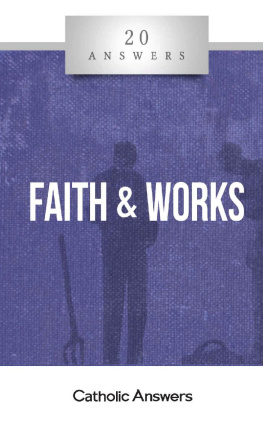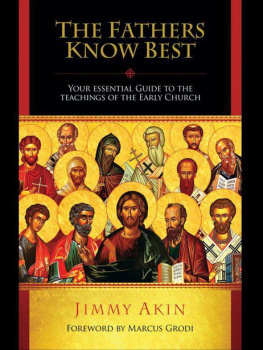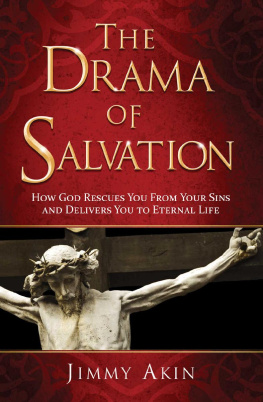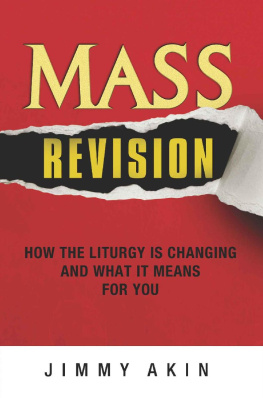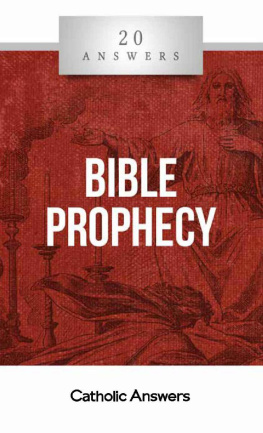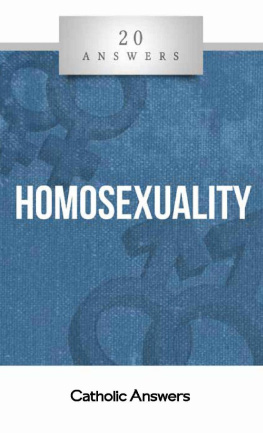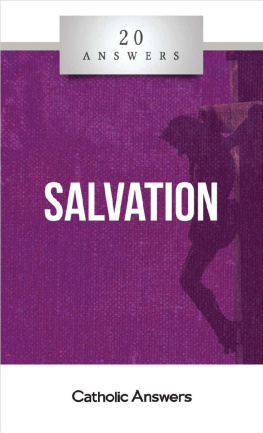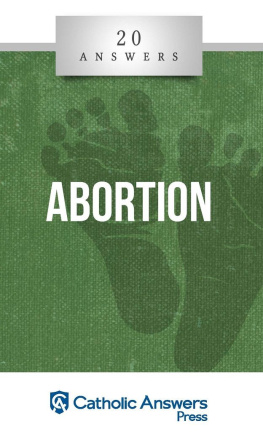Jimmy Akin - 20 Answers: Faith and Works (20 Answers Series from Catholic Answers Book 40)
Here you can read online Jimmy Akin - 20 Answers: Faith and Works (20 Answers Series from Catholic Answers Book 40) full text of the book (entire story) in english for free. Download pdf and epub, get meaning, cover and reviews about this ebook. year: 2020, publisher: Catholic Answers, genre: Religion. Description of the work, (preface) as well as reviews are available. Best literature library LitArk.com created for fans of good reading and offers a wide selection of genres:
Romance novel
Science fiction
Adventure
Detective
Science
History
Home and family
Prose
Art
Politics
Computer
Non-fiction
Religion
Business
Children
Humor
Choose a favorite category and find really read worthwhile books. Enjoy immersion in the world of imagination, feel the emotions of the characters or learn something new for yourself, make an fascinating discovery.
- Book:20 Answers: Faith and Works (20 Answers Series from Catholic Answers Book 40)
- Author:
- Publisher:Catholic Answers
- Genre:
- Year:2020
- Rating:5 / 5
- Favourites:Add to favourites
- Your mark:
- 100
- 1
- 2
- 3
- 4
- 5
20 Answers: Faith and Works (20 Answers Series from Catholic Answers Book 40): summary, description and annotation
We offer to read an annotation, description, summary or preface (depends on what the author of the book "20 Answers: Faith and Works (20 Answers Series from Catholic Answers Book 40)" wrote himself). If you haven't found the necessary information about the book — write in the comments, we will try to find it.
Jimmy Akin: author's other books
Who wrote 20 Answers: Faith and Works (20 Answers Series from Catholic Answers Book 40)? Find out the surname, the name of the author of the book and a list of all author's works by series.
20 Answers: Faith and Works (20 Answers Series from Catholic Answers Book 40) — read online for free the complete book (whole text) full work
Below is the text of the book, divided by pages. System saving the place of the last page read, allows you to conveniently read the book "20 Answers: Faith and Works (20 Answers Series from Catholic Answers Book 40)" online for free, without having to search again every time where you left off. Put a bookmark, and you can go to the page where you finished reading at any time.
Font size:
Interval:
Bookmark:
20 Answers
g
Faith & Works
Jimmy Akin

20 Answers: Faith & Works
Jimmy Akin
2020 Catholic Answers
All rights reserved. Except for quotations, no part of this book may be reproduced or transmitted in any form or by any means, electronic or mechanical, including photocopying, recording, uploading to the Internet, or by any information storage and retrieval system, without written permission from the publisher.
Published by Catholic Answers, Inc.
2020 Gillespie Way
El Cajon, California 92020
1-888-291-8000 orders
619-387-0042 fax
catholic.com
Printed in the United States of America
978-1-68357-174-2
978-1-68357-175-9 Kindle
978-1-68357-176-6 ePub
Introduction
Five hundred years ago, an enormous controversy erupted in the Church. The German monk Martin Luther was having difficulties with certain doctrines and practices, and in 1517 he proposed for academic debate his Ninety-Five Theses , touching off the Protestant Reformation, which would tear western Christianity in two.
Luthers difficulties initially concerned things like purgatory and indulgences, but as the controversy developed, the center of debate shifted. He and his followers ended up proposing two key doctrines that have gone on to define the Protestant movement.
The first concerns how man can be justified, or put right with Godin other words, how we can be forgiven our sins, be saved, and go to heaven. Luther said that we are justified by faith alone (Latin, sola fide ).
The second major teaching of the Reformation holds that all Christian doctrine and practice is to be formed by Scripture alone (Latin, sola scriptura ). In other words, every point of doctrine and practice needs to be proved from Scripture, without giving an authoritative role to Tradition or Church authority.
Since sola scriptura deals with how we are supposed to form our doctrines, it is sometimes referred to as the formal principle of the Reformation. By contrast, sola fide deals with the substance of the Christian faith, so it is often called the material principle of the Reformation. Both principles are considered crucial in Protestant circles, but since justification is the means by which individual Christians get to heaven, this principle is particularly important. Luther is often credited as saying that justification sola fide is the article by which the Church stands or falls.
What does Luthers formula mean? It is one thing to say that we are justified by faitha teaching clearly found in the New Testament (e.g., Rom. 3:26). But what is meant by saying that we are justified by faith alone ? What is being excluded by adding the word alone?
Some have said, Anything other than faith is being excluded. But is that true? Protestants affirm that we are justified by God and Christs death on the cross. Justification does not exclude those things. In reality, Luther and the Reformers had something in particular that they wanted excluded from justification: works.
They even appealed to Scripture to support this view. In Romans 3:28, Paul says that a man is justified by faith apart from works of law. Luther and the Reformers thought that Catholic doctrine and practice violated this principle. Protestants thus have accused the Church of teaching justification by faith and works or even justification by works.
Since faith alone is supposed to be the means by which we get to heaven, this resulted in an intense, centuries-long controversy, with Protestants accusing Catholics of teaching a false gospel that will send people to hell. Some Protestants even claim that Catholics are not Christians.
Whats at the center of the controversy? What do Catholics and Protestants really teach about justification, faith, and works? And what does it mean for living the Christian life? Here are twenty answers.
1.How have Protestant authors understood faith and works?
Although the phrase justification by faith alone is universal in Protestant churches, how it is understoodand the works it is meant to excludevaries from one group to another.
Based on Scriptures statement that even the demons believeand shudder (James 2:19), it has been recognized that not every kind of faith saves. This has sparked a debate in Protestant circles about what counts as saving faith or justifying faith.
At one end of the spectrum is a position found in some parts of Evangelicalism known as free grace theology. It holds that you have saving faith as long as you intellectually assent to certain theological truths, though there is a debate about which ones. Some free grace advocates hold that all you need to believe is that Jesus Christ will save you. Others argue that you must include additional beliefs, such as that Jesus is both God and man, that he died for our sins, and that he rose from the dead. Your mere agreement with these truths is enough to save you, even if you dont do anything else. The free grace view is sometimes disparaged as easy believism by its critics. Free grace theologians, in turn, accuse their critics of legalism.
Most Protestant theologians do not support free grace theology and have a more robust conception of what saving faith is. It is usually held to involve not only belief in certain theological truths, but also trusting God to actually give one salvation. The difference is between saying, I know that Jesus died to save me, and saying, I trust that Jesus will save me. This inclusion of trust in saving faith, along with intellectual assent, is universal among Protestant theologians, except for some free grace advocates.
Given the New Testament passages connecting repentance with the gospel and the forgiveness of sins (e.g., Mark 1:15; Acts 2:38; 3:19), Protestant authors have discussed how the need for repentance can be squared with the faith alone formula.
Some free grace theologians hold that repentance is not required for saving faith, as it would violate sola fide . Others have defined repentance as intellectually recognizing the sinfulness of ones actions, but they have said that changing ones behavior is not necessary. An active serial killer who revels in his crimes would still go to heaven as long as he believes Jesus saves him.
However, most Protestant theologians have held that a real rejection of sin, with a consequent willingness to change ones behavior, is necessary. This is harmonized with faith alone either by conceiving of repentance as a necessary step that precedes faith, or by building repentance into the concept of saving faith itself. In recent years, the latter view has sometimes been called Lordship salvation, since it holds that saving faith must include not only faith in Christ as Savior but also repentance from sins and a willingness to obey him as Lord.
If one is willing to obey Jesus, this naturally results in ones performing morally good actions or good works. This has led to the saying, Faith alone saves, but the faith that saves is never alone. In other words, saving faith will invariably result in good works.
The New Testament emphasizes that love is the fundamental principle of Gods law, and thus of good works (Rom. 13:810; Gal. 5:14; James 2:8; 1 John 5:3). Some theologians support the idea that saving faith includes the virtue of charity (i.e., love), though this view is not universal, and many maintain a distinction between charity and saving faith.
The New Testament also contains passages linking baptism to salvation (Acts 2:38; 22:16; Rom. 6:34; 1 Pet. 3:21), which has prompted discussion of how this may be squared with sola fide . Lutherans understand the formula in a way that does not exclude baptism as a means of justification, as do some Anglicans, Presbyterians (in the case of elect infants), and members of the Church of Christ movement. Yet many other Protestants see the idea of baptism as a means of salvation as a violation of the faith alone formula.
Next pageFont size:
Interval:
Bookmark:
Similar books «20 Answers: Faith and Works (20 Answers Series from Catholic Answers Book 40)»
Look at similar books to 20 Answers: Faith and Works (20 Answers Series from Catholic Answers Book 40). We have selected literature similar in name and meaning in the hope of providing readers with more options to find new, interesting, not yet read works.
Discussion, reviews of the book 20 Answers: Faith and Works (20 Answers Series from Catholic Answers Book 40) and just readers' own opinions. Leave your comments, write what you think about the work, its meaning or the main characters. Specify what exactly you liked and what you didn't like, and why you think so.

